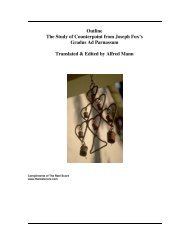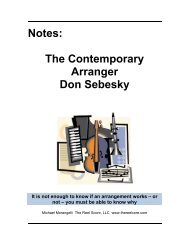An Outline of The History of Western Music Grout ... - The Reel Score
An Outline of The History of Western Music Grout ... - The Reel Score
An Outline of The History of Western Music Grout ... - The Reel Score
You also want an ePaper? Increase the reach of your titles
YUMPU automatically turns print PDFs into web optimized ePapers that Google loves.
(1) Cult <strong>of</strong> Apollo - lyre<br />
(2) Cult <strong>of</strong> Dionysus - aulos<br />
i) used to accompany dithyrambs (forerunners <strong>of</strong> Greek drama)<br />
d) Chorus & aulos use in the Tragedies <strong>of</strong> the Classic Age<br />
e) From 6th century B.C.E. lyre & aulos were independent solo instruments<br />
(1) As instrumental music grew more independent<br />
i) rise <strong>of</strong> virtuoso players<br />
ii) music became more complex<br />
(2) Aristotle warned against too much pr<strong>of</strong>essional training<br />
B. Characteristics <strong>of</strong> Greek <strong>Music</strong><br />
1. Surviving examples come from relatively late periods<br />
2. Resembled the music <strong>of</strong> the early Middle Ages<br />
a) Primarily monophonic (Melody without harmony or counterpoint)<br />
b) Instruments <strong>of</strong>ten embellished the melody while soloist or ensemble sang it<br />
(1) termed heterophony: Same melody performed simultaneously in more than<br />
one way i.e.. simply and ornamented, vocally & instrumentally<br />
(2) Melody & rhythm <strong>of</strong> Greek music were intimately bound up with melody &<br />
rhythm <strong>of</strong> poetry<br />
(3) Polyphony <strong>of</strong> independent parts was not present - it would come later<br />
c) No evidence <strong>of</strong> continuity <strong>of</strong> practice between Greeks & early Christians<br />
C. Greek <strong>Music</strong>al Thought<br />
1. Greek musical theory did affect the music <strong>of</strong> western Europe in the Middle Ages - we<br />
know more about Greek musical thought than about the music itself<br />
2. Two kinds <strong>of</strong> <strong>The</strong>oretical writings<br />
a) Doctrines on the nature <strong>of</strong> <strong>Music</strong>, place in the cosmos, effects, proper use in<br />
human society<br />
b) Systematic descriptions <strong>of</strong> the materials and patterns <strong>of</strong> musical composition<br />
3. <strong>The</strong>se insights in the science & philosophy <strong>of</strong> music have survived to this day<br />
a) Pythagoras (500 B.C.E.) was the legendary founder<br />
b) Aristides Quintilianus (4th Century C.E.) the last writer<br />
4. <strong>Music</strong> in the Greek mind was inseparable from numbers - which were thought to be<br />
the key to the entire spiritual and physical universe<br />
a) Plato explains in<br />
(1) Timaeus and <strong>The</strong> Republic<br />
(2) Pr<strong>of</strong>oundly influences medieval & Renaissance thought on music and its place<br />
in education<br />
b) Ptolemy<br />
(1) Leading astronomer <strong>of</strong> antiquity and a systematic music theorist<br />
(2) Mathematical laws were thought to underline the systems <strong>of</strong> both musical<br />
intervals and heavenly bodies - given poetic form by Plato in the myth the<br />
"music <strong>of</strong> the spheres"<br />
5. Close union <strong>of</strong> music & poetry<br />
a) "Lyric" poetry meant poetry sung to the lyre





